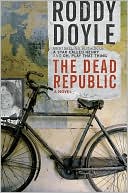

 |

|

The average rating for The Dead Republic based on 2 reviews is 2.5 stars.
Review # 1 was written on 2020-06-27 00:00:00 Cyndi Fuchs Cyndi FuchsI'll sum up this trilogy thus: First book was amazing and the best of the lot. Second book was borderline terrible with a ridiculous storyline. This third book was in between the other two. Average. Not nearly as good as the first but much improved over the second. |
Review # 2 was written on 2015-01-05 00:00:00 Chris Vaszary Chris VaszaryThe final installment in Doyle's trilogy is a bit of a mess. For starters, the inclusion of the Ford material at the beginning of the book doesn't allow Doyle's minimalist, speedy prose and plot to pull the reader in at the outset. This means that the first 100 pages or so are a bit of a slog, even though they set up Henry as a metafictional protagonist (even more so than in the other two volumes). He's the creator and "star" of his own life. Existentialist? No. Metafictional? Yes. In the first part, Henry and Ford (the famous filmmaker) attempt to make a film about Henry's life. But - get this - even the script secretary is named "Meta." The second part is much more compelling. Henry returns to Ireland and through his eyes, we see the second half of the 20th century enfold. Of course, Henry manages to get mixed up in all the political complexities and violence of the time - and Doyle's text covers a lot of historical ground in about 200 pages. Doyle's sentences serve as a history lesson of sorts. But because the lesson is so short, it's superficial and doesn't really get at the complexities of the age. It also makes Henry seem less human...less realistic. I know that Doyle wants to present Henry as a "white whale" of sorts - a symbol onto which anyone with any political or ideological perspective can attach meaning. And this allows him to demonstrate the futility and pointlessness of the "Troubles." Doyle also includes some awkward magical realism, the allegorical significance of which is all too simplistic. |
CAN'T FIND WHAT YOU'RE LOOKING FOR? CLICK HERE!!!